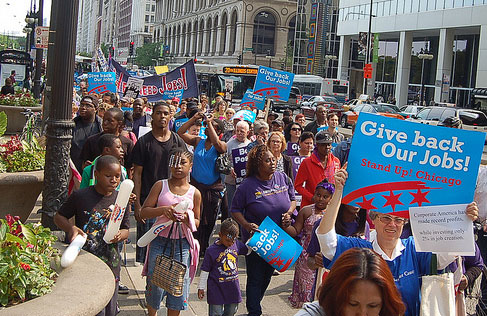
WASHINGTON (PAI) – In all the political shouting and analysis of Washington’s fiscal follies, there has been precious little discussion of what the gridlock means to workers and their families outside the Capitol Beltway.
Now some of it is starting to seep through, and it’s not pretty. But first, a primer on what’s going on:
Half of the federal government was effectively shut down starting on Oct. 1, held hostage to the House GOP majority’s “non-negotiable to keep it closed unless the Affordable Care is trashed or de-funded.” President Barack Obama and the Democratic-run Senate have a 1-word answer to such hostage taking: No.
Now the GOP is transferring that ACA threat, and a few of its other favorite causes – such as building the Keystone XL pipeline and rolling back environmental rules – to legislation to raise the U.S. debt limit.
Think of the debt limit as a credit line, which must be raised to pay for the nation’s past spending, from 1837 onwards. That debt will total $16.7 trillion on Oct. 17 and that figure is the debt limit.
Unless it’s increased, the government will start defaulting on some of its debts. Polls show about 40% of the country, and a majority of Republicans, do not want Congress to raise the debt limit. That’s possibly because nobody explains the practical consequences. Much of the commentary and analysis of the consequences of a default focus on its financial market impact.
But what about the impact on you and me? Here is what we have been able to glean, from various analyses – and this list is incomplete:
Your interest rates go up. That’s what happened when the U.S. teetered on the brink of default, again thanks to the House GOP, two years ago. One of the three major bond rating agencies downgraded U.S. bonds, for the first time in history. Interest the federal government pays investors who buy its bonds rose.
But so did interest on adjustable home mortgages, car loans, student loans and credit cards. All of those are tied, in one way or another to the federal interest rate.
If you’re a wounded warrior, you won’t get your check, or rehab, or anything else. More than 4 million veterans and survivors won’t get compensation, education, rehab or other benefits, starting in late October. First the Veterans Administration will exhaust its present reserves, which have been paying those costs so far.
Then it won’t have money at all, because the government, in default, won’t be able to float bonds to raise funds. Senate Veterans Committee Chairman Bernie Sanders, Ind.-Vt., calls that “an unimaginable disaster” for vets and their families.
The government would lack all the money to pay “creditors, beneficiaries, vendors, and other entities,” a background paper from the Council on Foreign Relations says. Payments would be delayed or denied. “Among other things, these payments could include military salaries, Social Security and Medicare payments, and unemployment benefits,” it adds.
State and local governments, their pension funds and private pensions would take a big hit, because they hold billions of dollars of U.S. Treasury securities, and those securities would get hit with the default – no interest payments – says a conservative private economist, Jeffrey Hummel of the University of California at San Diego.
“Outside of the household sector, with its unknown amount of hedge and trust fund holdings, the largest total dollar losses would fall on mutual funds, state and local governments and their retirement funds, and private pension plans,” he states.
“The heaviest hit would be money market funds, whose holdings of Treasuries constitute 13 percent of their total assets. Other mutual and closed-end funds hold only a little more than three percent in Treasuries. But for private pension funds, the proportion is eight percent, and for state and local government retirement funds, six percent.”
Hummel also points out the Social Security and Medicare trust funds hold trillions of dollars worth of U.S. Treasury bonds as security and they use the interest from those bonds, plus payroll tax revenues, to pay Social Security checks and Medicare expenses.
Thus, he predicts that a default means the two programs, plus Medicaid, will go through “a concomitant collapse,” overlooking the fact that payroll taxes still account for the huge majority of Social Security and Medicare income.
Photo: In Chicago, workers march for economic justice. People’s World Flickr












Comments